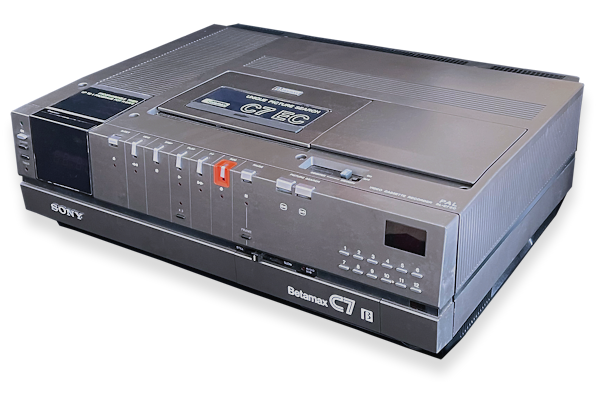The Sony SL-8000 was the UK's first Betamax machine. A 'piano-key' design
which was very advanced for its day. Features pause and a mechanical
tape counter.
The Sony SL-8080 was an improved version of the
SL-8000 looking almost identical. The 8080
was the first home VCR to have cue and review functions
(with video muted).
The Sony SL-3000 is the portable Betamax recorder which was intended to
interface with Sony cameras HVC-2000P and HVC-2010P. A very compact model
which could be operated horizontally or vertically.
The Sony SL-C5 was the baby brother to the SL-C7. For
it's day it was a modern looking machine. No piano keys, picture search
and a wired remote control.
The SL-C6 was Sony's attempt at a mass market machine. It had basic
features but looked very stylish.
The Sony SL-C7, similar in looks to the SLC-5
but far superior. A hi-tech design with controls hidden behind flaps, a
multi-event 4 event 2 week timer, APS index marking and a number of other
features.
The Sony SL-C9 was a 'top of the range' model for many years. Features:
9 event 14 day timer, Beta noise reduction, audio dubbing, camera input,
perfect picture pause, real-time counter, APS indexing, tape remaining
indicator.
The Sony SL-F1 was the successor to the SL-3000. Based internally
on the SL-C9 mechanics. Part of a range
of Sony units including a tuner, charger / power supply, PCM adapter, camera
and back pack.
The Sony SL-C20 a stylist looking basic model. Brother of the
SL-C30. No remote and was silver in colour.
The Sony SL-C30 a stylish slim looking basic Betamax model which had
a remote control. Available in black, silver, gold and red.
The Sony SL-C40 was a stereo version of the SL-C20
and SL-C30 models.
It had linear stereo and Beta noise reduction.
The SL-F25 was the last basic Betamax model ever in the UK. Because of the late
release not many were sold.With a 1 event/week timer and no other advanced
features the SL-F25 is not much to talk about.
The Sony SL-F30, at only 8cm it's one of the slimmest Betamax machines.
Individual channel selection buttons were replaced with up and down buttons.
A nice feature was the transparent hole in the lid to allow viewing of the
video cassette.
The Sony SL-F60 is almost identical to the SL-F30.
Like the SF-30 it is incredibly slim at only 8 cm high. Features an
Auto Play function.
The Sony SL-F90 is a Super-Beta machine.
Features include On Screen Graphics, goto zero, a picture sharpness control as well
as perfect pause (still).
The SL-HF100UB was one of only two Hi-Fi Betamax recorders released
by Sony in the UK domestic market. It was the companion machine to the
SL-HF950. Features a simulcast input and
multi event counter. A basic HiFi machine.
The Sony SL-HF150 was not released in the UK, similar to the
SL-HF100.
Features: On Screen Graphics and
a perfect pause (still) mode. It also features Hi-fi sound, headphone
socket and a 30 channel tuner.
The Sony SL-HF950 is another 'top of the range' machine. Features a unique
combination loading system, outstanding picture quality, Super Beta Pro
mode, video insert editing, SCART (Peritel) socket, trick speed controls,
and audio dubbing.
The Sony SLO-1700 is an industrial top loading machine built to last. Features
two large VU audio level meters, HiFi sound, linear stereo, seperate HiFi and
linear audio level adjustments, head hours counter, no tuner or clock.
The Sony SL-T50ME could play and record in PAL, NTSC ( both 4.43 and 3.58 ) and
MESECAM. It was a very slim unit and was produced in many colours
such as black, silver and gold. With illuminated functions switches it
could have a very bright appearance!
The SL-800ME is a truly world wide multi-standard Betamax. It contains three
tuners which allow it to receive PAL, SECAM and NTSC signals.
The SL-200ME MKIII was intended for the middle eastern market but a few
found their way into the UK. No trick playback, no perfect pause but it is a
Super Betamax only machine.
The BMC-100 was the worlds first combined video recorder and camera. It came out
long before the term Camcorder was in common usage. The BMC-100 used a tube camera
and a new Omega wrap video system.
The BMC-200 was an improved version of the BMC-100. It had an improved lens system.
The BMC-500 was the first camera/recorder to use a CCD (charge
coupled device) camera module.
| |||||||||||||

























